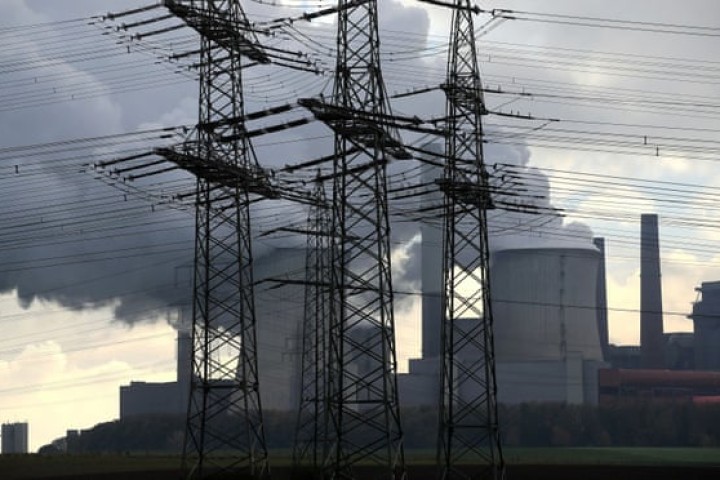From environment to economy: what to expect from new German government

A coal-fired power plant in Neurath, near Cologne. Photograph: Wolfgang Rattay/Reuters
Led by a party that has acted as Angela Merkel’s junior coalition partner for 12 of the last 16 years, and two parties with an energy to do things differently, Germany’s next government represents an odd mix of status quo thinking and reformist instincts.
The coalition agreement presented by the Social Democratic party (SPD), the Greens and the Free Democratic party (FDP) on Wednesday gives a hint of how German could change – and how it could stay the same.
Environment
By claiming a new climate-energy-economy super-ministry, as well as the ministries for the environment and agriculture, the Green party should have the means to shape Germany’s environmental agenda in a new, more unified way. In past governments the environment and economy ministries have often pushed in opposite directions.
The coalition agreement states that Germany will shut down its last coal-fired power plant by 2030, eight years earlier than envisioned by the outgoing government. By the same year the country is aiming to draw 80% of its energy from renewables.
Power generation from gas will be ended by 2040, and gas boilers will be banned in new buildings and existing ones replaced by 2030.
In a surprise move, the next transport minister will hail from the liberal FDP, which should squash the last hopes of those who want Germany to at last impose a maximum speed limit on the autobahn. The business-friendly FDP styles itself as the last remaining champion of the combustion engine.
Economy
The government will act on the incoming chancellor Olaf Scholz’s central campaign promise to raise the national minimum wage to €12 an hour, a move that will affect about 10 million people, especially in the struggling areas of the north-east and the Ruhr valley where the SPD performed strongly in September.
The reintroduction of a wealth tax – something called for by the SDP and the Greens in their election manifestos – did not survive coalition talks. The new finance minister, Christian Lindner, of the debt-averse FDP, is likely to act as an obstacle rather than a booster to further spending plans on behalf of the two liberal left parties.
Germany will legalise the controlled sale of cannabis for recreational use to adults, a decision that the German Economic Institute in Cologne predicts could create €2.5bn in additional revenues a year.
Europe
None of the parties that will make up the new government have promised a radical change in Germany’s stance on Europe. In Lindner the government will have a finance minister whom many countries in southern Europe fear could drag the continent’s most powerful economy back to the fiscally conservative stance of pre-pandemic times. Whether Lindner will shape the finance ministry or vice versa remains to be seen.
The coalition agreement states that Germany must live up to its role as Europe’s “anchor of stability”. “Solid finances and the frugal use of taxpayers’ money are the principles of our budget and finance policies,” it says.
The Greens have won the right to nominate the country’s European commissioner if and when the commission’s president is not from Germany, as is currently the case with Ursula von der Leyen, which is likely to give them some leverage in European policymaking.
The new government mentions the UK in passing, as one of the partners with which it wants to maintain close relations. “The UK remains one of Germany’s closest partners outside the EU … We want to cooperate on foreign and security policy as well.”
Relations with China and Russia
The new foreign minister, Annalena Baerbock, has vowed to forge a more “active” foreign policy agenda than that of her predecessor, mainly by setting a tougher tone in dealings with Russia and China. There will be more emphasis on democratic values and human rights, and less attention to the old credo of Wandel durch Handel – encouraging democratisation through economic engagement. The FDP, which is broadly transatlanticist in outlook, is likely to support that course.
During the Angela Merkel era, German foreign policy was in effect run from her chancellory, with the foreign ministry at times reduced to giving diplomatic soundbites. Whether the same will be the case under Scholz, who is not known for strong views on foreign policy, is unclear.
Some fairly specific language in the coalition agreement suggests the change of direction could be real. The parties call for fresh elections in Belarus and supports the use of further sanctions should Alexander Lukashenko not change its course. The government says it will raise human rights abuses, especially in Xinjiang, in its dealings with China, and it “supports democratic Taiwan’s issue-specific involvement in international organisations”.
NordStream II, the gas pipeline linking Russia and Germany that is supported by the SPD but opposed by the Greens, is not mentioned in the coalition treaty.
Covid
The most pressing issue Germany’s new government needs to address is the pandemic, with rising infections, a stagnant vaccination rate, and a state of epidemic emergency due to run out this month.
But during coalition talks the management of the pandemic has been the issue the three parties seemed least willing to answer. According to reports in the German media, the parties have tried to palm off the health ministry on each other, knowing full well that the next politician in the post faces a tough choice over a possible vaccine mandate and expectations that are nigh impossible to meet.
In the end it got stuck with the SPD, which said on Wednesday it would not announce the new minister until early December.

